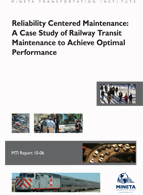- 408-924-7560
- mineta-institute@sjsu.edu
- Donate
Reliability Centered Maintenance: A Case Study of Railway Transit Maintenance to Achieve Optimal Performance
The purpose of this qualitative case study was to identify the types of obstacles and patterns experienced by a single heavy rail transit agency located in North America that embedded a Reliability Centered Maintenance (RCM) Process. The outcome of the RCM process also examined the impact of RCM on availability, reliability, and safety of rolling stock. This qualitative study interviewed managers (10 cases), and non-managers (10 cases) at the transit agency obtain data. The data may serve to help rail transit leaders determine future strategic directions that would improve this industry. Despite the RCM record in other fields, it has infrequently been used in heavy rail transit agencies. The research method for the first portion of this qualitative case study was to collect data from subjects by administering an open-ended, in-depth personal interview, of manager and non-managers. The second portion of the study explored how the RCM process affected rolling stock for availability, reliability, and safety. The second portion of the study used data derived from project documents and reports (such as progress reports, email, and other forms of documentation) to answer questions about the phenomena. The exploration and identification of the patterns and obstacles is important because organizational leaders in other heavy rail transit systems may use this knowledge to assist in embedding the process more smoothly, efficiently, and effectively to obtain the desired end results.
FELIX A. MARTEN, JR., DBA
For more than 20 years, Dr. Felix Marten has been employed with San Francisco Bay Area Rapid Transit District (BART). He and his team are proud of the fact that they completed and opened the San Francisco Airport extension. His efforts and former team continued to work to bring BART to San José, air BART to the Oakland International Airport, and eBART to connect into the Antioch/Byron area.
Dr. Marten has served in many positions with the BART district, including computer specialist, train control engineer, supervising engineer, manger of operations liaisons, and his current position of assistant superintendent of systems maintenance, where he oversees the maintenance of several divisions of the District. Dr. Marten has taught classes in business; operations management; physics; intermediate algebra; operating systems; analog, digital, and industrial electronics; and PC troubleshooting. He also headed the Cisco Networking Academy Program.
Dr. Marten has a BS in electronic engineering technology, and in computer engineering technology from Cogswell College, an MS in electrical engineering from International Technological University (ITU), an MS in public administration from Golden Gate University, a certificate in project management from UC Berkeley, and is a Cisco Certified Academy Instructor (CCAI). Additionally, Dr. Marten completed his dissertation to earn a DBA in business administration from the University of Phoenix (UOP).
-
Contact Us
San José State University One Washington Square, San Jose, CA 95192 Phone: 408-924-7560 Email: mineta-institute@sjsu.edu






